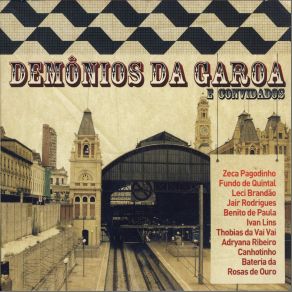Demônios da Garoa e Convidados / Demonios da Garoa e Convidados
Download links and information about Demônios da Garoa e Convidados / Demonios da Garoa e Convidados by Demônios Da Garoa / Demonios Da Garoa. This album was released in 1999 and it belongs to Samba, World Music, Latin genres. It contains 12 tracks with total duration of 36:26 minutes.

|
|
|---|---|
| Artist: | Demônios Da Garoa / Demonios Da Garoa |
| Release date: | 1999 |
| Genre: | Samba, World Music, Latin |
| Tracks: | 12 |
| Duration: | 36:26 |
| Buy it NOW at: | |
| Buy on iTunes $9.99 | |
Tracks
[Edit]| No. | Title | Length |
|---|---|---|
| 1. | Abrigo de Vagabundo | 2:51 |
| 2. | Apaga o Fogo Mané | 2:51 |
| 3. | Mulher Patrão e Cachaça | 3:13 |
| 4. | Samba da Garoa | 5:01 |
| 5. | A Vida É Dura | 2:58 |
| 6. | Samba do Arnesto | 2:53 |
| 7. | Ave Maria | 2:29 |
| 8. | Saudosa Maloca | 3:05 |
| 9. | Estação São Paulo | 2:50 |
| 10. | Marcha de Espera | 2:55 |
| 11. | Trem das Onze | 2:42 |
| 12. | Iracema | 2:38 |
Details
[Edit]Memory of Brazilian music is almost non-existent. There is virtually no interest in the big recording companies in reissuing their old catalogs. So the kind of reissues/compilations such as the ones brought by this Raízes Do Samba series have to be praised, even if the booklet is incredibly poor, bringing no information for the novice whatsoever. The original records from which these tracks were taken, all big hits by the paulista group Demônios Da Garoa (the group's name, Drizzle's Demons, makes reference to that city's permanent weather), are all since long out of print. Comprising the group's recordings from 1955 to 1990, they were carefully remastered and the sound quality is fully acceptable.
The group keeps a regional formation (traditional choro group), with cavaquinho, violão de sete cordas (Brazilian seven-string guitar), percussion, and violão tenor, with an occasional clarinet, being the oldest active group in the world, according to Guinness Book of Records, 1994. They interpret the typical São Paulo samba, with its massive Italian influence in the broken Portuguese lyrics (Adoniran Barbosa, the best proponent of this style, in his "Um Samba No Bexiga," talks about a date set for "mezzanotte o'clock") and its chronicling of the everyday of that city.